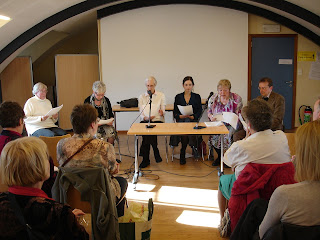
The bandstand in Parc de Bruxelles featured in Villette.
On Sunday 18 October a group of about 20 Brontë fans braved the freezing weather to meet up in front of the Chapelle Royale (the Protestant Church in Brussels) for a fascinating tour of some spots relating to Charlotte and Emily's stay in Brussels.
The tour was led by Myriam Campinaire of the Brussels Brontë Group who took us on an amazing walk, peppered with very interesting information on why and how the two sisters came to Brussels, what they did here, the places they visited, the people they met and what they thought of the Belgian people. She frequently quoted from their letters and read extracts from Charlotte's The Professor and Villette. Myriam also gave us a glimpse of Brussels in the early 1840's: a young country which had just come into existence after a civil war fought mainly in Brussels and which had seen the battle of Waterloo unfolding at its doorstep.
I am not going to go into details of the tour since it will spoil the little discoveries that one comes across, as expertly guided by Myriam (for all the people who will go on future walks). I just want to give you a brief overview of what we saw. As I mentioned the tour started out in front of the Chapelle Royale where Charlotte and Emily went every Sunday. From there we moved on to the Place Royale, where Myriam went through the history of the area in the early19th century. The square and surrounding areas were a focal point of Brussels life, since the Belgian nobility lived and worked here. We than went to the Park, where we heard about the history of the park, its design and construction. I was fascinated to hear that Peter the Great of Russia, Wellington and Robert Louis Stevenson had all visited the park and had a number of 'adventures' here.
Our next stop was the Rue Baron Horta, where we learned that the Fortis Bank building and the Palais des Beaux Arts ("Bozar") arts centre now stand on the area where the Pensionnat Heger used to stand. I am ashamed to say that I must have passed this road hundreds of times and never noticed the small plaque which the Bronte Society put up just to the left of the entrance of the Bozar building, which commemorates Charlotte's and Emily's stay in Brussels.
After walking through some small streets in the area we concluded our walk by visiting the Cathedral of Saint Michel and Saint Gudule, where Charlotte Bronte actually went to confession and which is described in great detail in her letters and Villette.
A small group of us ended our morning with a short visit to the Bellevue museum (situated right next to the Place Royale) where after fortifying ourselves with some warm soup and coffee, we visited the underground museum. To my amazement we found ourselves in a small underground city, which stretches all the way under the Place Royale and the Royal Palace. Here you can see and walk through some of the original roads and pavements and a small section of Rue Isabelle still remains. If we closed our eyes we could imagine Charlotte and Emily walking down the cobbled roads, chattering away, all excited to be on their 'European' adventure ……
All I can say in conclusion is that I will never look at this part of Brussels in the same way again and my name is definitely down on the list for future walks.
Patricia de Gray




